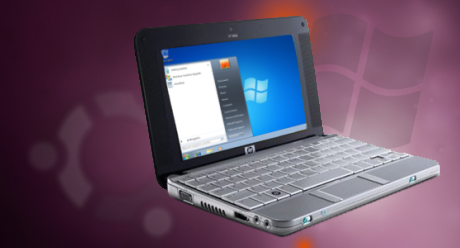Windows 7 can revive netbooks, not Ubuntu alone

Ubuntu is all good and well, but still the operating system that wipes the floor is Windows 7 in the netbook market. That is, what little market there is for the netbook at the moment; overshadowed by the iPad and increasingly productive smartphones.
Chris Dawson believes Ubuntu can revive the netbook market, especially within schools dispite their lack of appeal. His two test machines were designed and built for Ubuntu's netbook and education edition. But the specifications of the laptop are nearly identical to my new Christmas present, a Toshiba NB250, but runs Windows 7 a breeze.
But does the operating system have more of a factor in consumer purchasing than the device itself? Maybe a combination of the two, to be fair, but hardware has come along way since the original netbook.

I like Ubuntu. Not only did I bite the bullet and engage with the operating system as a first time user for an entire 48 hours with the support from the ZDNet community, but the latest release of Ubuntu 10.10 also has other new users positively engaged from the word go.
Dawson's first hand experience of Ubuntu vs. my first hand experience of Windows
Ubuntu didn't want to work on my new netbook, annoyingly, after my first attempt to install Windows XP, an operating system with a lesser memory footprint than Windows 7, failed. Windows XP did finally install, but Toshiba's drivers were simply not available for the device and continuing would have resulted in VGA graphics at 640x480 and with no networking controller.After spending the best part of Christmas Day trying to install an operating system other than Windows 7 - certainly not Vista- on a netbook with almost exactly the same specs as Dawson's tester netbooks, I settled with Windows 7 Enterprise. This time, however, was without any of the pre-installed crapware that bloated out the out-of-box experience and pushing the netbook's memory usage to nearly three-quarters.
After disabling non-essential Windows processes such as HomeGroup services, Tablet PC input and all Aero themes, and the installation of Microsoft Security Essentials, classified as an excellent and superior anti-virus to paid products, the memory footprint was way under a third consumed.
To cut a long story short, Windows 7 runs incredibly smoothly, even on memory intensive applications like CityVille (Dawson and I are neighbours on the increasingly popular Facebook simulation game), just with a few reasonable cutbacks. To also consider that the platform runs, obviously, all Windows applications is surely yet another reason why Windows is vastly superior to Ubuntu.
Why Windows?
While I don't want this to be one giant advertisement or advocation to and for Windows, nor do I want to appear that I am slating Ubuntu for being a poor operating system. On both counts you would be wrong.But netbooks are surprisingly powerful compared to only six months ago, and with better processors managing memory better, partly down to Intel Atom chips in my opinion, which are present on both Dawson's netbook and my machine, netbooks don't have to settle for second best.
In an ideal world, even though Windows XP may be dead and buried for the desktopand laptop market, it is still a brilliant operating system and indirectly designed for netbook perfection. Ubuntu netbook edition works well, but lacks the full Ubuntu desktop experience.
But Windows 7 cuts out the bulk, stress and sluggishness from Vista which would make even the desktop experience difficult, onto a netbook device with great results.
Have you got a netbook? Which operating system do you use and why?